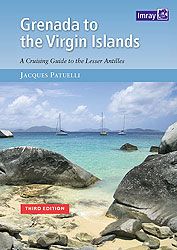| |
|

LA DESIRADE
A cliffy tableland, Désirade sits E of
Guadeloupe like a forward sentry post.
Short of water and desperately hoping
for landfall during his second voyage,
Columbus named the island Désirada in
November 1493. It wasn’t a very suitable
name for an island destined to have a sad
future. From the beginning of the 18th
century it became a place of exile for
lepers and, a few decades later, for the
sons of delinquent families. Some noble
family names from France, hardly
changed, can still be found amongst the
island’s surnames. The arid soil was only
able to support small-scale cotton
farming, and that soon disappeared when
slavery was abolished. Thereafter the
Désiradiens made their meagre
subsistence from market gardening,
fishing or, for those who were bold
enough, as crew on the merchantmen.
|
|
|
|
The leprosarium was closed in 1954.
Since then the more or less mixed race
population of 1700, smallholders and
fishermen rubbing along on their 22 sq
km of limestone pebble, have rarely
known better days. From time to time a
hurricane, like Hugo in 1989, devastates
the island’s fragile economy, leaving in its
wake just a few shattered cottages. For a
while now, attracted by the austere and
wild beauty of the wave-beaten cliffs
where one can imagine oneself on the
prow of a ship, a few tourists have
started to arrive. Others are happy with the quiet, sandy beaches like Anse Petite
Rivière and Plage du Souffleur. The two
main settlements are little more than
villages. Grande Anse (or Beauséjour) in
the W and Baie Mahault in the E are
joined by the island’s only road. Places to
stay are few and simple with prices to
match. The restaurants, simple ‘lolos’,
serve Creole dishes, plain and
unpretentious. On top of that you can
expect kindness and a warm welcome.
Regular small ferries from Désirade’s
little fishing harbour to St François on
Guadeloupe take less than an hour.
For more details on La Desirade :
|
|
|






